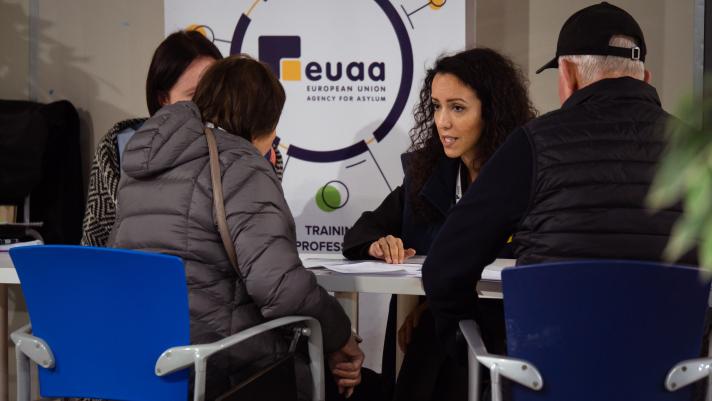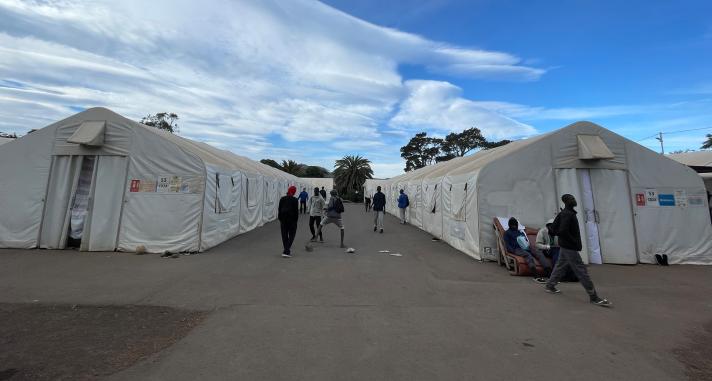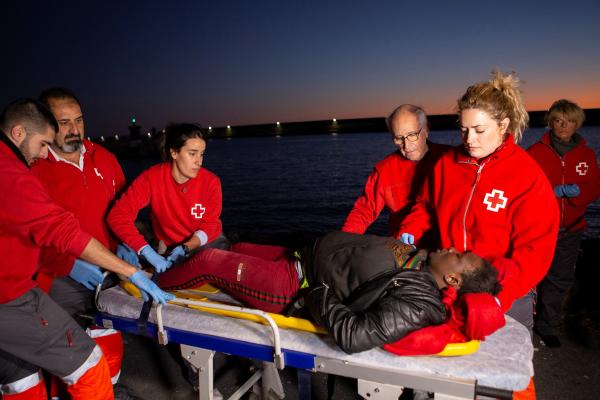The European Commission has been supporting Spain with EU funding and expertise, as well as permanent staff deployments, to strengthen the national migration management system. Together with the European Union Agency for Asylum (EUAA) and the European Border and Coast Guard Agency (Frontex), present both in mainland Spain and the Canary Islands, it supports the Spanish authorities in establishing an effective and future-proof migration management system.
The Commission assists national efforts to ensure external border control, enhance asylum and return procedures, further develop reception capacity, including for unaccompanied minors, fight migrant smuggling and strengthen legal migration and integration efforts.

Managing borders and arrivals
The EU supports the Spanish authorities with border management. Under the Joint Operation Indalo and the Joint Operation Canary Islands, Frontex staff are deployed in the South of Spain and the Strait of Gibraltar and the Sea of Alboran, and in the Canary Islands, to help manage Spain's sea borders in a safe and effective manner. During the summer, Frontex coordinates Joint Operation Minerva as well, providing further support to the Spanish authorities in the Strait of Gibraltar area. Frontex staff have also been deployed to help manage air borders in the international airports of Madrid Barajas and Barcelona El Prat, in the context of Joint Operation Focal Points Air.
Under the Border Management and Visa Instrument (BMVI), EU funding is provided for the establishment of several first reception centres, carrying out identification and registration procedures for newly arrived asylum seekers in coastal areas, such as Cartagena, Almeria, Motril, Malaga, Algeciras, Las Palmas de Gran Canaria or Arrecife. Funding is provided also for the modernisation of the External Surveillance System (SIVE), which enables the detection of embarkations near the Spanish coasts.
Spain has benefited from additional EU funding, through Emergency Assistance (EMAS) and the Thematic Facilities, which finance several of its Specific Actions. For the 2021-2027 period, Spain has received one Emergency Assistance grant of EUR 17.4 million in total, as well as several Specific Actions under the Border and Visa instrument reaching over EUR 40 million.
Improving reception capacity and conditions
Under the new programming period 2021-2027, the reform of Spain’s reception system remains a priority, with EUR 110 million allocated under the Asylum Migration and Integration Fund (AMIF) to improve reception capacity and procedures.
Spain has also benefited from Emergency Assistance (EMAS) and the Thematic Facilities since 2020, to improve the reception capacity of specific areas under migratory strain, such as the Canary Islands and Ceuta. Approximately, EUR 87 million were provided for the establishment of new Identification and Registration Centres in the Canary Islands, as well as Emergency Reception Facilities of about 6,000 places. Another EUR 23.3 million were granted to the City of Ceuta, to address reception needs, and to help authorities identify and assist the most vulnerable asylum seekers.

Protecting unaccompanied migrant children
Strengthening guardianship and alternative care for unaccompanied migrant children is a priority for the EU. In 2021, the Commission supported local and national authorities in Ceuta to address the rise in the arrival of unaccompanied minors. In 2023, the Commission also granted EUR 9.6 million to strengthen the protection of unaccompanied minors in the Andalusia region.
The EUAA has also been supporting national authorities for the improvement of the reception of unaccompanied minors since 2023 through a number of capacity building measures, as foreseen in the bilaterally agreed Operational Plan 2023-2026. The Agency is providing training to national and regional authorities, as well as civil society organisations, involved in the child protection system.
Relocations
The European Commission supports the voluntary relocation of asylum applicants and beneficiaries of international protection from one EU Member State to another and to 4 Schengen associated countries. Between August 2022 and February 2024, 237 applicants for international protection have been relocated from Spain to other European countries with the support of the EUAA and the IOM.
Under the Pact on Migration and Asylum, solidarity will become part of a structured and mandatory process as regulated under the Asylum and Migration Management Regulation (AMMR). Once the new legal framework enters into application, it will cover three different types of solidarity measures: relocation, financial contributions and alternative measures (i.e. staff and in-kind support) and, under certain conditions as a secondary level solidarity measure, there will also be responsibility offsets. The Commission as well as EUAA and IOM will continue providing support for the implementation of the Voluntary Solidarity Mechanism, which can remain the framework for providing solidarity until the entry into application of the AMMR on 12 June 2026.
Supporting integration
Ensuring the full participation and integration of migrants is an integral element of the EU Pact on Migration and Asylum and a key objective of the AMIF National Programme for Spain.
The programme includes strengthening strategic cooperation at national and regional levels, labour market and civic integration, as well as ensuring non-discrimination. The Spanish Observatory for Racism and Xenophobia, a leading institution for the promotion of migrants’ social inclusion and the fight against racism, is a key partner on the ground that has been supported by AMIF. A driving force for the adoption and implementation of the Strategic Framework for Citizenship and Inclusion 2023-2027, it also leads the Forum for the Social Inclusion of Migrants.
News corner

- News article
Two European Commission (EC) Emergency Assistance actions were set up in Spain ensuring better reception and registration of migrants. The situation is now stable and the Asylum Migration and Integration Fund (AMIF) continues to support the projects and the national migration management system.
- 1 min read
